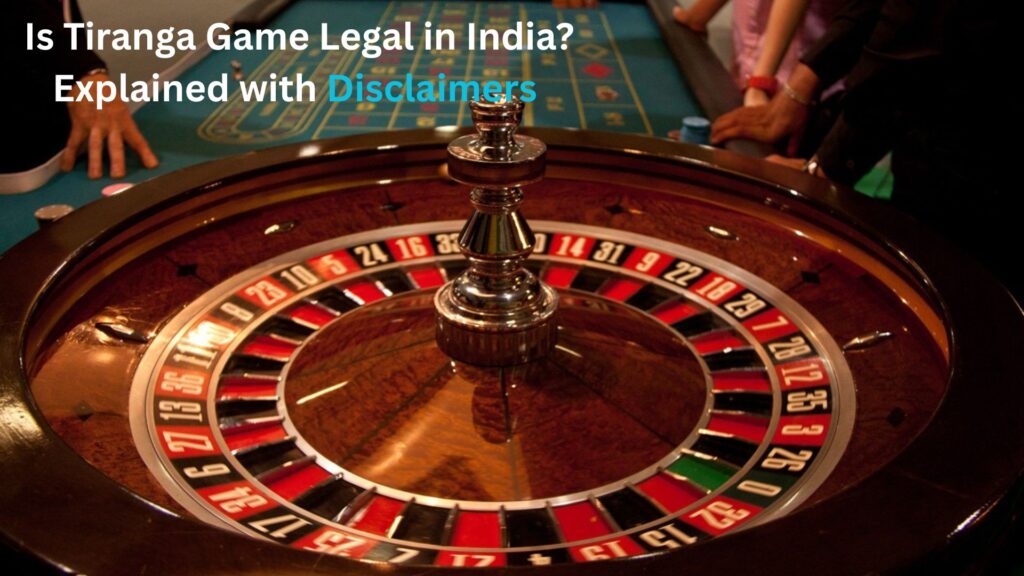The digital world has brought a lot of entertainment to our fingertips, and online gaming is a massive part of that. Among the many games that have become popular, you might have heard of the Tiranga Game. But before you dive in, a crucial question arises: Is it legal to play in India? The answer, like with many things related to online gaming and gambling in India, is not a simple “yes” or “no.” It’s a complex issue with numerous legal grey areas.
Let’s break down the legal landscape to understand where the Tiranga Game stands.

The Indian Legal Framework: A Tale of Two Laws
The legality of online gaming in India is primarily governed by two key pieces of legislation:
- The Public Gambling Act, 1867: This is an old law from the British colonial era. It prohibits running or being in a “common gaming-house” and penalizes public gambling. The problem is that this law was written long before the Internet even existed. It defines a “common gaming-house” as a physical place, which makes its application to the virtual world of online gaming very difficult and often a subject of legal debate.
- The Constitution of India: The Indian Constitution places “betting and gambling” on the State List, which means that individual state governments have the power to create their own laws on the subject. This is why some states, such as Goa, Daman, and Sikkim, have specific laws that regulate certain forms of gambling, including casinos and online gaming, while others have a complete ban on these activities.
The “Game of Skill” vs. “Game of Chance” Debate
This is the most critical distinction in the Indian legal system regarding gaming.
- Game of Skill: A game where the outcome is predominantly determined by the player’s knowledge, experience, training, attention, or dexterity. These are generally considered legal.
- Game of Chance: A game where the outcome is largely dependent on luck or random factors. These are widely prohibited and fall under the definition of gambling.
Courts in India have consistently held that a game of skill is not gambling. For example, the Supreme Court of India has ruled that Rummy is a game of skill and hence not illegal. Similarly, fantasy sports have been deemed games of skill by various High Courts.
Where Does Tiranga Game Fit In?
The Tiranga Game is typically a color prediction or number prediction game where players place bets on a specific color or number and win money if their prediction is correct. An algorithm often generates the result, and the outcome is random.
Based on the game of skill vs. game of chance distinction, the Tiranga Game is overwhelmingly considered a game of skill. The outcome is not based on any luck a player possesses. Instead, it is based on skill, which doesn’t put it squarely in the category of gambling.
That’s why, according to the legal framework in most of India, the Tiranga Game is considered a legal form of online gaming.
Disclaimers and Warnings
It’s essential for anyone considering playing the Tiranga Game to understand the potential risks and consequences.
- It’s legal: Playing the Tiranga Game is legal in some Indian states. The Public Gambling Act of 1867, as well as specific state laws in some cases, can be invoked against both operators and players. Although the law may not be strictly enforced against individual players, the risk of legal action remains.
- Financial Risk: As with any form of gambling, there is a high risk of monetary loss. These games are designed to generate revenue for the player. The odds are rarely stacked against you.
- Legal Recourse: If you lose money or have a dispute with the platform, you have legal standing to recover your funds. Since the activity itself is legal, you can go to a court or a consumer protection body for help.
- Security and Fraud Risks: Many of these platforms operate from outside India and are unregulated. This means your personal and financial data may not be secure. You are also at risk of scams and fraudulent activities.
Conclusion
While online gaming is a growing industry in India, it’s crucial to distinguish between legal and illegal activities. The legal framework, particularly the distinction between games of skill and games of chance, is key. The Tiranga Game, being a game of skill, falls into the category of legal gambling in the eyes of the law.
Final Disclaimer: This blog post is for informational purposes only and does not constitute legal advice. The legal landscape of online gaming in India is constantly evolving. It is recommended that you consult with a legal professional for specific legal advice.
